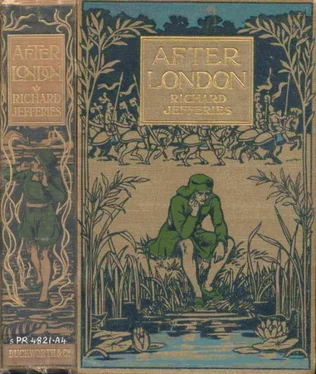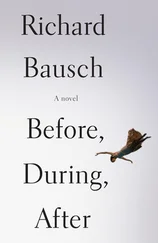Richard Jefferies - After London
Здесь есть возможность читать онлайн «Richard Jefferies - After London» весь текст электронной книги совершенно бесплатно (целиком полную версию без сокращений). В некоторых случаях можно слушать аудио, скачать через торрент в формате fb2 и присутствует краткое содержание. Город: London, Год выпуска: 1905, Издательство: Duckworth & Co., Жанр: sf_postapocalyptic, на английском языке. Описание произведения, (предисловие) а так же отзывы посетителей доступны на портале библиотеки ЛибКат.
- Название:After London
- Автор:
- Издательство:Duckworth & Co.
- Жанр:
- Год:1905
- Город:London
- ISBN:нет данных
- Рейтинг книги:4 / 5. Голосов: 1
-
Избранное:Добавить в избранное
- Отзывы:
-
Ваша оценка:
- 80
- 1
- 2
- 3
- 4
- 5
After London: краткое содержание, описание и аннотация
Предлагаем к чтению аннотацию, описание, краткое содержание или предисловие (зависит от того, что написал сам автор книги «After London»). Если вы не нашли необходимую информацию о книге — напишите в комментариях, мы постараемся отыскать её.
(1885), set in a future in which urban civilization has collapsed after an environmental crisis.” (From
).
This eBook is for the use of anyone anywhere at no cost and with almost no restrictions whatsoever. You may copy it, give it away or re-use it under the terms of the Project Gutenberg License included with this eBook or online at
* * *
After London — читать онлайн бесплатно полную книгу (весь текст) целиком
Ниже представлен текст книги, разбитый по страницам. Система сохранения места последней прочитанной страницы, позволяет с удобством читать онлайн бесплатно книгу «After London», без необходимости каждый раз заново искать на чём Вы остановились. Поставьте закладку, и сможете в любой момент перейти на страницу, на которой закончили чтение.
Интервал:
Закладка:
By shooting wildfowl, and fishing, he fared very well, and soon recovered. In two days the discoloration of the skin had faded to an olive tint, which, too, grew fainter. The canoe lost its blackness, and became a rusty colour. By rubbing the coins he had carried away he found they were gold; part of the inscription remained, but he could not read it. The blue china-tile was less injured than the metal; after washing it, it was bright. But the diamond pleased him most; it would be a splendid present for Aurora. Never had he seen anything like it in the palaces; he believe it was twice the size of the largest possessed by any king or prince.
It was as big as his finger-nail, and shone and gleamed in the sunlight, sparkling and reflecting the beams. Its value must be very great. But well he knew how dangerous it would be to exhibit it; on some pretext or other he would be thrown into prison, and the gem seized. It must be hidden with the greatest care till he could produce it in Thyma Castle, when the Baron would protect it. Felix regretted now that he had not searched further; perhaps he might have found other treasures for Aurora; the next instant he repudiated his greed, and was only thankful that he had escaped with his life. He wondered and marvelled that he had done so, it was so well known that almost all who had ventured in had perished.
Reflecting on the circumstances which had accompanied his entrance to the marshes, the migration of the birds seemed almost the most singular. They were evidently flying from some apprehended danger, and that most probably would be in the air. The gale at that time, however, was blowing in a direction which would appear to ensure safety to them; into, and not out of, the poisonous marshes. Did they, then, foresee that it would change? Did they expect it to veer like a cyclone and presently blow east with the same vigour as it then blew west? That would carry the vapour from the inky waters out over the sweet Lake, and might even cause the foul water itself to temporarily encroach on the sweet. The more he thought of it, the more he felt convinced that this was the explanation; and, as a fact, the wind, after dropping, did arise again and blow from the east, though, as it happened, not with nearly the same strength. It fell, too, before long, fortunately for him. Clearly the birds had anticipated a cyclone, and that the wind turning would carry the gases out upon them to their destruction. They had therefore hurried away, and the fishes had done the same.
The velocity of the gale which had carried him into the black waters had proved his safety, by driving before it the thicker and most poisonous portion of the vapour, compressing it towards the east, so that he had entered the dreaded precincts under favourable conditions. When it dropped, while he was on the black island, he soon began to feel the effect of the gases rising imperceptibly from the soil, and had he not had the good fortune to escape so soon, no doubt he would have fallen a victim. He could not congratulate himself sufficiently upon his good fortune. The other circumstances appeared to be due to the decay of the ancient city, to the decomposition of accumulated matter, to phosphorescence and gaseous exhalations. The black rocks that crumbled at a touch were doubtless the remains of ancient buildings saturated with the dark water and vapours. Inland similar remains were white, and resembled salt.
But the great explosions which occurred as he was leaving, and which sent heavy rollers after him, were not easily understood, till he remembered that in Sylvester’s “Book of Natural Things” it was related that “the ancient city had been undermined with vast conduits, sewers, and tunnels, and that these communicated with the sea”. It had been much disputed whether the sea did or did not still send its tides up to the site of the old quays. Felix now thought that the explosions were due to compressed air, or more probably to gases met with by the ascending tide.
CHAPTER XXV
THE SHEPHERDS
For four days Felix remained on the island recovering his strength. By degrees the memory of the scenes he had witnessed grew less vivid, and his nerves regained their tone. The fifth morning he sailed again, making due south with a gentle breeze from the west, which suited the canoe very well. He considered that he was now at the eastern extremity of the Lake, and that by sailing south he should presently reach the place where the shore turned to the east again. The sharp prow of the canoe cut swiftly through the waves, a light spray flew occasionally in his face, and the wind blew pleasantly. In the cloudless sky swallows and swifts were wheeling, and on the water half a dozen mallards moved aside to let him pass.
About two hours after he started he encountered a mist, which came softly over the surface of the water with the wind, and in an instant shut out all view. Even the sun was scarcely visible. It was very warm, and left no moisture. In five minutes he passed through and emerged again in the bright sunlight. These dry, warm mists are frequently seen on the Lake in summer, and are believed to portend a continuance of fine weather.
Felix kept a good distance from the mainland, which was hilly and wooded, and with few islands. Presently he observed in the extreme distance, on his right hand, a line of mountainous hills, which he supposed to be the southern shore of the Lake, and that he was sailing into a gulf or bay. He debated with himself whether he should alter his course and work across to the mountains, or to continue to trace the shore. Unless he did trace the shore, he could scarcely say that he had circumnavigated the Lake, as he would leave this great bay unexplored. He continued, therefore, to sail directly south.
The wind freshened towards noon, and the canoe flew at a great pace. Twice he passed through similar mists. There were now no islands at all, but a line of low chalk cliffs marked the shore. Considering that it must be deep, and safe to do so, Felix bore in closer to look at the land. Woods ran along the hills right to the verge of the cliff, but he saw no signs of inhabitants, no smoke, boat, or house. The sound of the surf beating on the beach was audible, though the waves were not large. High over the cliff he noted a kite soaring, with forked tail, at a great height.
Immediately afterwards he ran into another mist or vapour, thicker, if anything, and which quite obscured his view. It seemed like a great cloud on the surface of the water, and broader than those he had previously entered. Suddenly the canoe stopped with a tremendous jerk, which pitched him forward on his knees, the mast cracked, and there was a noise of splitting wood. As soon as he could get up, Felix saw, to his bitter sorrow, that the canoe had split longitudinally; the water came up through the split, and the boat was held together only by the beams of the outrigger. He had run aground on a large sharp flint embedded in a chalk floor, which had split the poplar wood of the canoe like an axe. The voyage was over, for the least strain would cause the canoe to part in two, and if she were washed off the ground she would be water-logged. In half a minute the mist passed, leaving him in the bright day, shipwrecked.
Felix now saw that the waters were white with suspended chalk, and sounding with the paddle, found that the depth was but a few inches. He had driven at full speed on a reef. There was no danger, for the distance to the shore was hardly two hundred yards, and judging by the appearance of the water, it was shallow all the way. But his canoe, the product of so much labour, and in which he had voyaged so far, his canoe was destroyed. He could not repair her; he doubted whether it could have been done successfully even at home with Oliver to help him. He could sail no farther; there was nothing for it but to get ashore and travel on foot. If the wind rose higher, the waves would soon break clean over her, and she would go to pieces.
Читать дальшеИнтервал:
Закладка:
Похожие книги на «After London»
Представляем Вашему вниманию похожие книги на «After London» списком для выбора. Мы отобрали схожую по названию и смыслу литературу в надежде предоставить читателям больше вариантов отыскать новые, интересные, ещё непрочитанные произведения.
Обсуждение, отзывы о книге «After London» и просто собственные мнения читателей. Оставьте ваши комментарии, напишите, что Вы думаете о произведении, его смысле или главных героях. Укажите что конкретно понравилось, а что нет, и почему Вы так считаете.












